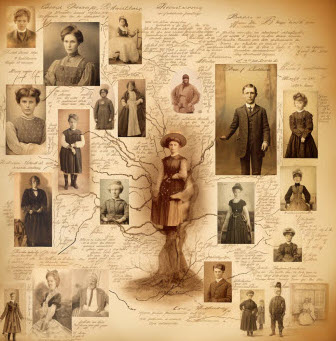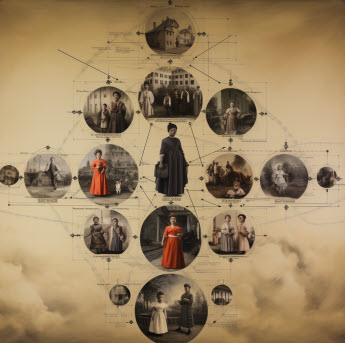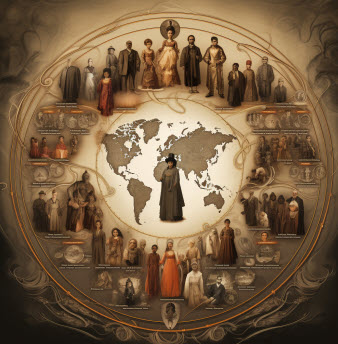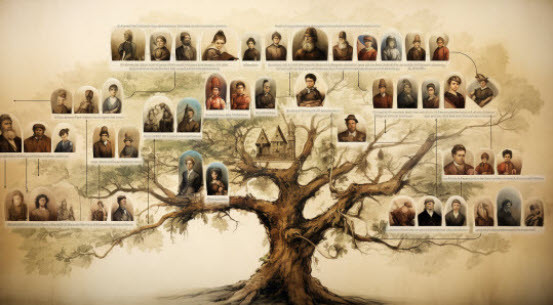Introduction
Ancestry tracing, also known as genealogy, is the process of researching and documenting one’s family history and lineage. It involves uncovering information about ancestors, tracing family lines, discovering connections between individuals, and understanding the historical contexts in which they lived. Ancestry tracing typically involves gathering and analyzing various types of records, including birth certificates, marriage records, census data, immigration documents, military records, and more.
A Global Appeal
The appeal of ancestry tracing lies in its ability to provide individuals with a deeper understanding of their roots, heritage, and identity. It allows people to connect with their past, learn about their ancestors’ experiences, and appreciate the historical events that shaped their family’s narrative. Ancestry tracing can also help individuals discover long-lost relatives, uncover family stories and traditions, and establish a sense of belonging and continuity across generations.

Strong Demand
In addition to its personal and emotional significance, ancestry tracing has emerged as a popular hobby and a professional pursuit for many individuals. With the advent of online databases, digitized records, and genealogical software tools, tracing one’s family history has become more accessible than ever before. This accessibility has led to a growing demand for professional genealogists and ancestry researchers who can assist individuals in navigating the complexities of genealogical research.
As a side venture, ancestry tracing offers several advantages:
1. Flexibility: Ancestry tracing can be pursued on a part-time basis, allowing individuals to balance it with other commitments such as a full-time job or family responsibilities.
2. Low startup costs: Starting an ancestry tracing business requires minimal investment in tools, software, and online subscriptions, making it an affordable venture to launch.
3. Scalability: Ancestry tracing businesses can scale up gradually as demand grows, allowing individuals to expand their client base and services over time.
4. Remote work opportunities: Ancestry tracing can be conducted remotely, allowing individuals to work from home and serve clients from around the world using digital communication tools and online research resources.
5. Personal fulfillment: For individuals passionate about history, genealogy, and storytelling, ancestry tracing offers a rewarding opportunity to help others discover and preserve their family heritage.
In summary, ancestry tracing is a powerful and lucrative side venture that combines personal fulfillment with professional opportunities. By leveraging digital tools, research skills, and a passion for uncovering family stories, individuals can turn their love for genealogy into a fulfilling and profitable business venture.

Here’s why you should investigate this as a profitable and fascinating venture.
During the pandemic, there was a surge in the popularity of genealogy.
There was a 60% increase in the number of searchers on one ancestry website. Thousands of families across the UK explored their family trees.
Despite all the advances of the internet, most people still find tracing their family tree can be very daunting and time-consuming.
Most of us are put off by the very thought of having to go down to the records office or trawl the Internet. However, millions of people are fascinated by the tracing of ancestors.
Tens of millions have done DNA tests to try to reveal their roots, and a dozen TV programs have sprung up to try and satisfy an insatiable curiosity about people’s ancestors.
Here are some mainstream programs that spring to mind:
1. A New Leaf
While some of the other popular programs in this list delve into celebrity family trees, the Ancestry.com-sponsored program “A New Leaf” shines a spotlight on everyday people. Originally airing on NBC as part of the network’s Saturday morning block, “The More You Know,” this 13-episode series offers insights into the familial journeys of ordinary individuals.
2. Ancestors
BYUtv’s 23-episode series, “Ancestors,” traverses family history records worldwide, blending expert genealogy guidance with poignant personal anecdotes. From unravelling genealogical mysteries to igniting inspiration, this series offers a compelling exploration of ancestral legacies. Watch episodes for free on BYUtv.
3. Ancestors in the Attic
Hosted by Jeff Douglas, “Ancestors in the Attic” embarks on lively journeys across Canada and beyond in search of familial roots. This dynamic series brings viewers along on road trips and global quests to uncover ancestral tales. Locate the show on DVD through WorldCat or your local library.
4. Finding Your Roots with Henry Louis Gates, Jr.
Historian Henry Louis Gates, Jr., delves into the lineage of notable Americans in each episode of “Finding Your Roots.” Offering historical insights and occasionally revealing DNA surprises, this series intertwines captivating narratives with ancestral revelations. Season 10 premieres in January 2024 on PBS.
5. Genealogy Roadshow
PBS’s “Genealogy Roadshow,” featuring a trio of genealogy experts, adopts an “Antiques Roadshow” format to address family history inquiries. Through succinct segments adorned with archival visuals, the show delves into the ancestral quests of everyday Americans. Access episodes via subscription on the PBS website.
6. The Genetic Detective
Genetic genealogy expert CeCe Moore leads this ABC series, utilizing DNA research to aid law enforcement in solving cases. Follow Moore and her team as they employ genealogical methods to catch criminals. Access episodes for free on ABC’s website.
7. The Generations Project
BYUtv’s “The Generations Project” unveils family secrets as ordinary individuals explore their ancestral pasts. Through genealogical investigations, participants unravel family mysteries and unearth insights into their identities. Watch all three seasons for free on BYUtv’s website.
8. Long Lost Family
Hosted by Chris Jacobs and Lisa Joyner, TLC’s “Long Lost Family” orchestrates emotional reunions between separated relatives. Witness heartfelt encounters as seekers are reunited with long-lost family members. Tune in on TLC, online with a cable subscription, or via purchase on YouTube.
9. Relative Race
“Relative Race” follows four teams on an “Amazing Race”-style journey to meet newfound relatives discovered through DNA testing. Witness the thrill of discovery as contestants traverse the country in pursuit of familial connections. Stream all ten seasons for free on BYUtv’s website.
10. Roots Less Traveled
Ancestry.com’s “Roots Less Traveled” invites teenagers on a familial adventure, exploring shared ancestry with family members. Premiering in 2020 with season four in January 2022, the series airs during NBC’s Saturday morning block. Catch episodes on NBC.com.
11. Who Do You Think You Are?
Following the footsteps of its British counterpart, the American edition of “Who Do You Think You Are?” accompanies celebrities on archival journeys to uncover ancestral tales. Stream seasons 5 through 10 on TLC’s site with a cable subscription, or catch the newest season on NBC’s website or Peacock.

The Costs and the Potential Profits
There are healthy profits to be made by offering people family history tracing as a
service. It’s something you can do from home, using email, social media, or
video calling apps like Zoom and Skype to contact customers.
What’s more, there’s a way you can take advantage of Chat GPT to make it
easier, faster, and cheaper to start up and run than ever before.
You’re going to need a few upfront costs like these:
● ChatGPT – £16 per month.
● Subscriptions to ancestry websites – around £250 per year (you
● Ancestry software (more in a moment about this) – about £30.
● Membership of The Society of Genealogists – optional, though it will add credibility to what you are doing. It is less than £60 p.a.
● A small budget for a low-cost Facebook campaign (no more than £10-£20 a week)
These might seem a little high, but you could be making £500+ a week from
just 2 customers! Even if you ran this part-time in the evenings or weekends you could easily be making an extra £200 – £300 per week.
Step One – Gathering the Genealogy Software and Tools
First off, get your hands on some decent genealogy software. This will help
you to record the information logically whilst also being able to see at-
a-glance the relationships between all members of the ‘tree’.
You start with an individual who has commissioned you. Then add a
spouse and then parents. Once the parents are entered, the subject’s
siblings may then be added as children of the parents and so on throughout
the process.
Repeat this by then adding parents to the parents and so on. This
procedure will ensure that all the relationships are recorded correctly and
will facilitate the reporting that will come later.
Ancestry Resources at Your Disposal
Note: Prices etc., may have changed since publication of this article.
Here’s a comprehensive list of websites and resources useful for ancestry, genealogy, and family trees, along with explanations and cost information where applicable:
- Ancestry.com
- Ancestry.com is one of the largest and most comprehensive genealogy websites.
- It offers access to billions of historical records, including census data, birth, marriage, death records, military records, and immigration records.
- It provides tools for building family trees and connecting with other researchers.
- Subscription required: Costs vary based on the subscription plan, ranging from $19.99 to $49.99 per month.
- FamilySearch.org
- FamilySearch is a free genealogy website operated by The Church of Jesus Christ of Latter-day Saints.
- It offers access to a vast collection of historical records, including birth, marriage, death records, census data, and more.
- FamilySearch provides collaborative family tree building and research tools.
- Free to use.
- MyHeritage
- MyHeritage is a genealogy platform offering access to historical records, family trees, and DNA testing services.
- It provides tools for building family trees, exploring historical records, and connecting with relatives.
- Subscription required: Plans range from $129 to $299 per year.
- Findmypast
- Findmypast specializes in British and Irish genealogy records, but it also offers collections from around the world.
- It provides access to census records, birth, marriage, death records, military records, and more.
- Subscription required: Plans start at $10.75 per month.
- Geni
- Geni is a collaborative genealogy platform where users can build their family trees and connect with other researchers.
- It offers both free and premium subscription options.
- The basic subscription is free, while Geni Pro costs $119.40 per year.
- WikiTree
- WikiTree is a free, collaborative genealogy website where users can build and share their family trees.
- It emphasizes collaboration and sourcing of information.
- Free to use.
- AncestorSearch
- AncestorSearch is a free search tool that allows users to search multiple genealogy databases simultaneously.
- It helps users locate ancestors across various platforms.
- Free to use.
- Cyndi’s List
- Cyndi’s List is a comprehensive directory of genealogy resources available online.
- It categorizes links by topic and provides a wealth of information on various aspects of genealogical research.
- Free to use.
- RootsWeb
- RootsWeb is a free genealogy community with access to user-contributed family trees, message boards, and resources.
- It provides access to various databases and research tools.
- Free to use.
- National Archives
- The National Archives (USA) and other national archives worldwide offer extensive collections of historical records, including census data, military records, immigration records, and more.
- Many records are available online for free, while others may require a fee for access or copies.
Remember, the availability of records and resources may vary depending on your location and the regions you’re researching. Always cross-reference information and be mindful of the sources you use in your genealogical research.
Those are the various sites at your disposal. Now you need to find clients.
The best place, of course, is on social media. In my view, it is easy to offer to take on say 1 or 2 clients on a free trial basis, so that you can practice on real-life cases, to hone your craft. By doing this, you will generate a lot of interest and followers!

Here’s an easy way to advertise on Facebook even if you have been banned from advertising. Check out Balloonary you can put ads on FB minutes from now, through their AI platform
Why not try local advertising? There is a brilliant website called Next Door where you can contact people in your area and ask if anyone wants their family tree traced
Then there is social media – Instagram, etc. If you have registered in our affiliate program, you can download images like the ones in this article, to show off your new venture
…and there is so much more that you can do – Leaflets, flyers, FB groups, and so on. The possibilities to get clients for next to nothing are endless!
Here is a bonus for you. I have prepared a questionnaire that you can give to people (or work through it with a client) to get the information that you need to start digging up the past. Feel free to download it and adapt it as you see fit.
When a client gets in contact, and you agree to carry out the job, you can
use ChatGPT to do pretty much everything.

How to Start The Process
Get the questionnaire filled out. Then use online resources like Ancestry.co.uk, Findmypast.co.uk,
FamilySearch.org, and The National Archives to start your search. They
have collections of census records, birth, marriage, and death certificates,
military records, immigration/emigration records, and more.
Get the questionnaire filled out. Then use online resources like ancestry.co.uk, findmypast.co.uk familysearch.org, and the National Archives to start your search. They have collections of census records, birth, marriage, and death certificates, military records, immigration/immigration records, and much more.
If you want to discuss anything in this article, please Contact Us

















